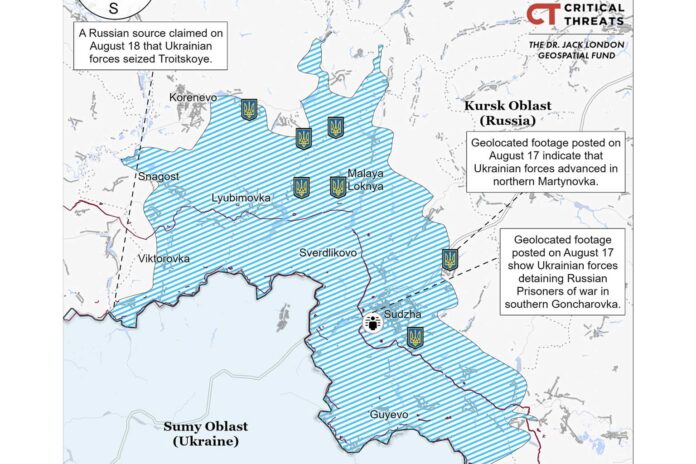
In another sign of escalation on Monday, Moscow has said that Ukraine has struck and damaged a third bridge in the Kursk region as Kyiv forces attempt to expand the Ukrainian incursion within Russian territory.
Russia’s Investigative Committee on Monday confirmed the attack on the bridge located along the River Seym, which winds through Kursk.
Ukrainian authorities have yet to comment on the Russian claim.
Russia has also said its marines captured a group of 19 Ukrainian soldiers in the region, the state RIA Novosti news agency reported. The outlet described the Ukrainians as “saboteurs”.
On Sunday, Ukraine had said it had destroyed a second bridge across the River Seym. The attacks on the region’s bridges in a matter of days come as Ukraine presses a cross-border offensive that began on August 6.
On Friday, it said it had struck a bridge in the Russian town of Glushkovo.
“Minus one more bridge,” Ukrainian Air Force Commander Mykola Oleshchuk wrote on Telegram on Sunday, publishing an aerial video of a blast tearing through the bridge.
He said the attacks were designed to disrupt Russian supply lines.
“The Air Force aviation continues to deprive the enemy of logistical capabilities with precision air strikes,” Oleshchuk said, without giving a date for the attack.
Hours later, Ukrainian President Volodymyr Zelenskyy praised the incursion and stated its aims for the first time.
“It is now our primary task in defensive operations overall: to destroy as much Russian war potential as possible and conduct maximum counteroffensive actions. This includes creating a buffer zone on the aggressor’s territory,” President Zelenskyy said.
The remarks give an idea of the strategic Ukrainian thinking behind the incursion.
“It means local tactical success by Ukrainian forces, but it also means long-range Ukrainian strikes behind Russian front lines – attacking railroads, ammunition dumps, airbases, trying to destroy the jets that attack them. So, basically a combination of local successes and deep strikes – essentially to defang Russia’s military in the [area] so they can’t be nearly as aggressive, nearly as dangerous” said Kyiv based military experts.
They added that the talk of a buffer zone is “key” to Ukraine’s long-term thinking.
But to most military observers it is clear that Ukraine can’t keep advancing in Kursk. Sooner or later they will run dry.
The buffer zone Ukrainian forces hope to create is ‘so Russia can’t approach the border too closely and use its artillery and air strikes on Ukraine’.
Pro-Kremlin military bloggers acknowledged the destruction of the first bridge near Glushkovo, about 12km (7.5 miles) north of the Ukrainian border, saying it would disrupt supply lines.
According to Russia’s Mash news site, the attacks left only one bridge in the area intact, potentially complicating Moscow’s attempts to replenish its forces and evacuate civilians.
Until now, Kyiv said little about the goals of the cross-border assault.
The incursion began with tanks and other armoured vehicles, the largest attack on Russia since World War II.
Ukraine’s military chief, Oleksandr Syrskii, claimed last week that his forces had advanced across 1,000sq km (390sq miles) of Kursk, although it was not possible to independently verify the extent of its control.
The incursion has helped boost Ukrainian morale as Russia pushes forward in Ukraine’s eastern Donetsk region.
On Sunday, Moscow claimed to have taken the village of Svyrydonivka, about 15km (9 miles) from Pokrovsk, which is a key logistics hub for Ukrainian troops and towns across the eastern front.
Zelenskyy has urged Kyiv’s allies to lift the remaining restrictions on the use of Western weapons on targets deeper inside Russia, including in Kursk, saying his troops could deprive Moscow “of any ability to advance and cause destruction” if granted sufficient long-range capabilities.
Ukraine says bases inside Russia have been used to launch long-range attacks on Ukraine’s cities and energy infrastructure, causing significant damage and casualties.
On Sunday, Moscow targeted Kyiv with ballistic missiles for a third time this month, according to officials.
Zelenskyy said Russia had launched more than 40 missiles, 750 guided aerial bombs and 200 attack drones against Ukrainian villages and cities in the past week alone.
(with agency inputs)









